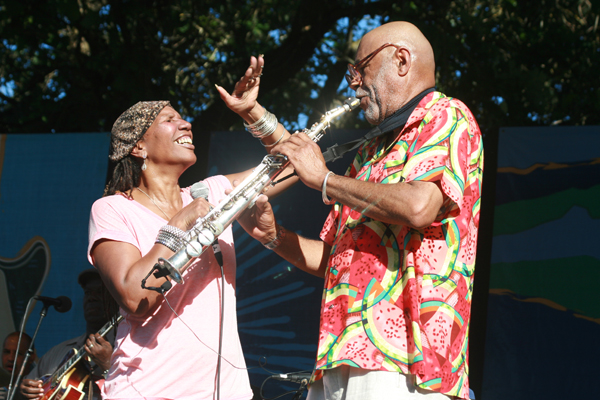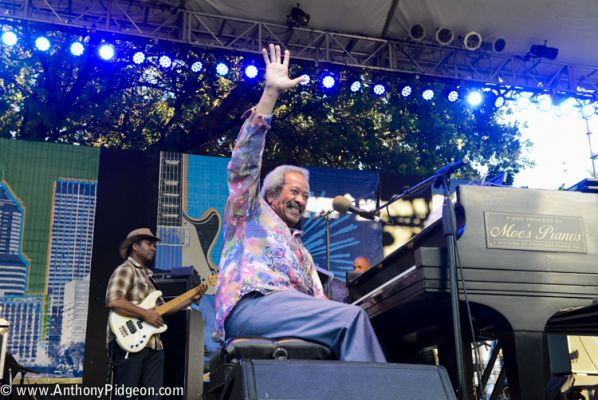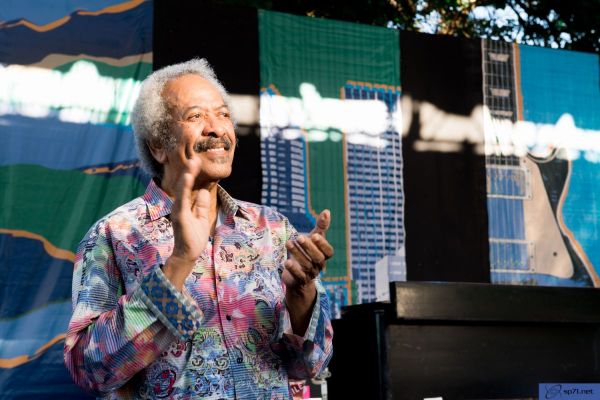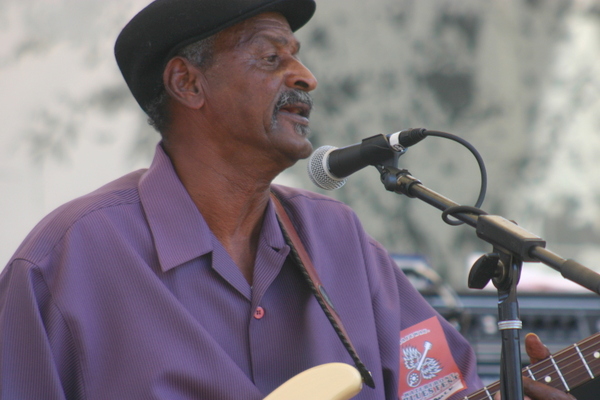Home > Rock
07/01/2020
Allen Toussaint: Familiar songs and brand new tunes at the 2015 Safeway Waterfront Blues Festival - video interview and review
By TOM D'ANTONI // Allen Toussaint played the 2015 Waterfront Blues Festival on July 3. He died the following November. Here's a video interview from a few weeks before the festival.Plus coverage of the day.
Here's what we wrote at the time:
Allen Toussaint, the New Orleans hitmaker and beloved icon, visits the Safeway Waterfront Blues Festival on Friday, July 5. He was in his office in New Orleans when we talked with him via Skype. He'll be introducing some new tunes at the festival.
New Orleans music fans, in fact, music fans in general got real excited when they found out that Allen Toussaint was coming to play at the Safeway Waterfront Blues Festival this year. He is the man responsible for so many million-sellers, producer and writer of nearly every hit that came out of New Orleans after the Dave Bartholomew/Cosimo Matassa era, particularly in the 1960s, ‘70s and ‘80s.
He wrote mostly for others, not really having a hit on his own, although some of his versions of songs made popular by others are vastly superior. “Southern Nights” is a good example. A dreamy tune of great beauty, it was turned into a thin, bouncy top 40 hit by Glen Campbell, although it earned Toussaint a lot of money. On the other hand, the Pointer Sisters did a perfect, classic interpretation of "Yes We Can."
His collaborations are legendary. Ernie K-Doe's "Mother In Law," the many hits of Lee Dorsey, iconic tunes like Jessie Hill's "Ooo Poo Pah Doo"...it would take the rest of the page to list them all.
He lost most of his things in the Katrina flood, forcing him to move temporarily to New York, but re-energizing his career, ironically. He moved back home and has continued to produce memorable music, including the totally unexpected album of Jazz, The Bright Mississippi.
He's a virtuoso, a master, a professor in the New Orleans music sense of the title; and he is a gracious gentleman.
He was in his office in New Orleans on a recent morning when we talked. The interview speaks volumes about the joy he brought to the music and his untiring pursuit of his art.
And then after his performance at the 2015 Waterfront Blues Festival, I wrote:
Toussaint was the centerpiece of a day which commemorated the tenth anniversary of the New Orleans flood.
Most folks in attendance at the Safeway Waterfront Blues Festival 2015 on Friday, July 3 knew at least one of his songs. Many knew lots of his songs. Some knew all of them. I am one of those. I loved Allen Toussaint's songwriting, singing and playing before I knew his name.
So no matter how many times you've seen him, the craniums of grown adults exploded when he launched into Professor Longhair's Big Chief and followed it without pause with Tipitina. It wasn't that we weren't expecting to hear Professor Longhair's music, of course we were.We're used to hearing Dr. John and Jon Cleary play Professor Longhair, but there's a reverence and majesty, a love and respect for the man and his music that comes out of Toussaint.
Many in the crowd were moved to chills and tears when he played those first familiar notes of "Big Chief." And to follow that tune seamlessly without stopping and begin "Tipitina," well...... Folks who have been loving Toussaint since the tail end of the Rock 'n Roll era c.1959, suddenly had a collective thought. "This may be the last time I'll ever hear him play this because one of us might be dead before too many years go by."
Not that anyone could guess that he's seventy-seven years old. He looks twenty years younger and plays better now than he ever has.
He did two new-ish tunes. One, "It's a New Orleans Thing," a tribute to the Big Easy, as only the man who defined the music of New Orleans can put it. Another was "Beale Street to Broadway," a warm tribute to B.B. King. It was a fine example of what Toussaint does best, provide a melody you can't forget, give you the warmth and love he has for B.B. and lay some trenchant social commentary on you.
Those are his hallmarks. Remember "Yes We Can?" The Pointer Sisters had a big hit with that. So did Barack Obama. It is Toussaint's hopeful anthem to peace and good will in the world. He sang that on the festival stage.
He played "Night People," which both he and Lee Dorsey recorded, plus several other Toussaint/Dorsey collaborations including "Working In A Coal Mine,' and "Everything I Do Gonn' Be Funky." Dorsey had the hits with those but Toussaint also recorded his own versions.
There was a stretched-out version of "St. James Infirmary Blues." There was an Ernie K-Doe medley made up of "A Certain Girl," Mother In-Law," and the related "Fortune Teller."
The magical combination of his strong yet tender playing, his silky voice, his social commentary and the unmistakable rhythm of New Orleans was the center piece of a day at the festival which honored the tenth anniversary of the day the levies broke and New Orleans flooded.
Lil Buck Senegal
It started at noon with a set of Swamp Blues by Lil' Buck Sinegal, who played with Zydeco king Clifton Chenier for seventeen years, and spent time in Buckwheat Zydeco's band, while all along nurturing a solo career. His spectacular but understated set included Portlanders Tony Coleman (B.B. King's drummer for over thirty years) and John Mazzocco who spent time playing bass in John Lee Hooker's band.
Later, in the afternoon, Reggie Houston put together a tremendous band made up of Brian Foxworth on drums, Gary Fontaine on bass, plus two other horns and keyboard player; his Crescent City Connection band. For me it was a special occasion. When I awoke the morning of the flood, I wrote an Op-ed piece for the Oregonian based on my feelings in the wake of the flood, having been at the Candlelight that Tuesday night; Reggie Houston's regular night to play..
I first read it at the Katrina Benefit thrown by the Blues Festival people just days after the levies broke. I read then with Reggie Houston accompanying me on sax. We did it again on Friday, July 3, at the festival’s ten year commemoration of the flood. Reggie’s whole band backed me up this time.

A little while later, flood survivor Charmaine Neville led her band.
Galactic finished up the Katrina remembrances, although there was nothing directly related to the flood, other than the rather major fact that the band survived and has thrived since then.
What do we learn from commemorating this tragic event? That the spirit of New Orleans, the spirits of us all can live on despite anything. It was bittersweet, considering all of the musicians and other creative folks we have lost both in New Orleans and Portland. Which of us will be next? Who will we be commemorating at next year's festival. One thing we know, the music lives on and what we've done to make that music and bring the spirit of it to our friends and neighbors is our little piece of immortality.










